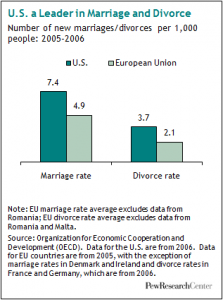 The Daily Number is provided by the Pew Research Center that “highlights an important finding or trend.” A few days ago, the number looked at the unusually high rates of both marriage and divorce in the United States. When compared to the European Union, Americans are far more likely to experience marriage (51% higher) or divorce (76% higher). Interestingly, however, American divorce rates in the sample year (33% of the measured events) were similar to those in the EU (30%).
The Daily Number is provided by the Pew Research Center that “highlights an important finding or trend.” A few days ago, the number looked at the unusually high rates of both marriage and divorce in the United States. When compared to the European Union, Americans are far more likely to experience marriage (51% higher) or divorce (76% higher). Interestingly, however, American divorce rates in the sample year (33% of the measured events) were similar to those in the EU (30%).
So What?
While much is being publicized about the changing nature of marriage and family, relatively little is noted about the wide variance in rates of marriage and divorce. Evangelical Christians are an interesting case study. Ideologically they tend to favor marriage while limiting the role of divorce. According to research done by the Barna Group, Evangelicals are only somewhat more likely to marry (6%) at some point in their lives than is the general population in the United States and are as likely as the general population to experience divorce.
The research conducted by the Pew Research Center and TIME Magazine referenced in the Daily Number, also showed that while a higher percentage of college educated adults have been married in any given year during the almost half century comparison period the gap is widening. Comparing the numbers from 1960 and 2008 the declines have impacted all groups:
- Among the college educated, marrieds declined from 76% to 64%
- Among those with some college education, marrieds declined from 72% to 48%
- Among those with high school or less education, marrieds declined from 69% to 50%
In 1960 the greatest differential between college educated and those with less education was 7%. In 2008, the number had increased to 16%, which suggests a significant widening in the rates of marriage based on educational level.
- Why do you think the rates of marriage and divorce in the United States are so much higher than in the European Union?
- Why does it matter that rates of divorce among Evangelical Christians and the general population are almost identical?
- What are the implications of the widening educational marriage gap? What issues have contributed to this shift?
- How does your faith shape your understanding of marriage and divorce?